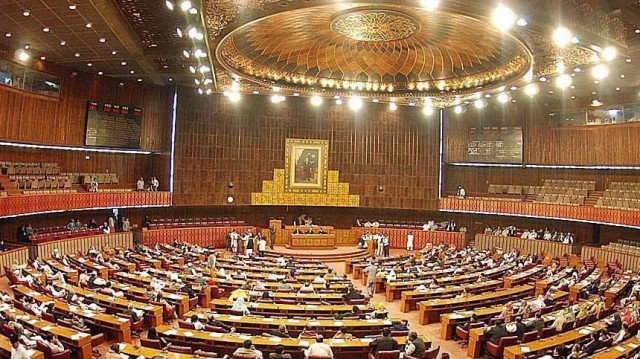Senate clears bills for NAB, electoral law tweaks
Legislation was passed by NA a day earlier; only president's assent required for them to become law

The Senate on Friday passed two significant bills – the Elections (Amendment) Bill, 2022 and the National Accountability (Second Amendment) Bill 2021 – a day after they were cleared by the lower house of parliament.
The bills passed in the National Assembly on Thursday sought to reverse the changes made in the election laws by the previous PTI government on the use of electronic voting machines (EVMs) and i-voting for overseas Pakistanis and curbing the powers of the National Accountability Bureau (NAB).
They were presented in the Senate by Parliamentary Affairs Minister Murtaza Javed Abbasi and Law Minister Azam Nazeer Tarar, respectively.
The house was informed that Sections 94 and 103 of Elections Act, 2017 were to be amended vide Act No.LV of 2021 for using i-voting and EVMs for the next general elections.
“The Election Commission of Pakistan (ECP) faces technical difficulties to embark upon conducting elections as per amended provisions,” it read.
Read Govt plans to 'dodge' president for approval of Elections Amendment Bill
“Since Article 218(3) of the Constitution obligates the ECP to conduct free, fair and transparent elections, the instant bill proposes to restore the amendments of Act No. LV of 2021 to their original contents for conducting more pilot projects before using I-Voting and EVMs in general elections.”
After the bills’ approval from both houses, only the president's assent is required for them to become law.
When Abbasi presented the electoral reforms bill, Senate Chairman Sadiq Sanjrani asked whether or not it should be sent to the relevant committee.
Tarar told the chairman that the committee had already approved the bill.
He maintained that overseas Pakistanis had not been deprived of their right to vote.
He added that the ECP had been asked to ensure voting rights while assuring secrecy.
"The ECP said we will not be able to conduct elections [using EVMs]. The Election Commission should ensure overseas Pakistanis can vote."
Dr Shahzad Waseem, the leader of the opposition in the Senate, said they would not allow anyone to deprive overseas Pakistanis of their right to vote or compromise on the use of EVMs.
Tarar pointed out that former science minister Senator Shibli Faraz and former railways minister Azam Swati were part of the Senate committee that had approved the bill.
To this, Shibli said the government was trying to give the impression – based on "mala fide intentions – that the bill was acceptable to him.
"Votes were equal in the committee [meeting] during which the bill was considered," he added. “The ECP’s objections were just a piece of paper that had no value.”
After Shibli’s response, the opposition senators started chanting slogans again.
Subsequently, the Senate chairman asked whether or not the bill should be sent to the committee but most of the members answered in the negative.
The Elections (Amendment) Bill 2022 was later passed by the Senate.
Tarar later presented the National Accountability (Second Amendment) Bill 2021, which was also passed.
The session was adjourned till 4pm on Monday.
The Elections (Amendment) Bill, 2022 aims to conduct pilot projects in local by-elections before using i-voting and EVMs in the next general elections.
The NAB law amendment bill included that the deputy chairman of the anti-graft body would become acting chairman following the top official's retirement. The process to appoint a new chairman would begin two months prior to the incumbent's retirement and be completed in 40 days. Federal and provincial tax matters as well as regulatory bodies' decisions were removed from NAB's purview. Judges would be appointed in accountability courts for a three-year period and cases would be decided within a year. NAB would be bound to ensure the availability of evidence prior to arrest. The amendments also included up to five-year imprisonment for filing a false reference.
Despite their presence, three PPP senators – Raza Rabbani, Farooq H Naek and Mustafa Nawaz Khokhar – did not vote on both the bills placed before the upper house of parliament.
Talking to The Express Tribune, Senator Naek confirmed that they did not vote on the two bills related to amendments to the accountability law and electoral reforms as they have some reservations. However, he expressed his inability to share further details.
It has been learned that these senators believed that there should have been much broader legislation on electoral reforms rather than reversing the amendments made by the previous government.
Sources told The Express Tribune that these senators also believed that the amendments to the accountability law should be made to address the grievances of the public at large and it could no longer be used for victimisation.
Senator Naek’s bill on amendments to the accountability law is already pending in the Senate committee.
Political analysts believe that there should be consensus on the legislation related to the accountability law as well as electoral reforms. They say that the coalition government should also try to engage with the PTI on both laws.



1725254039-0/Untitled-design-(24)1725254039-0-208x130.webp)















COMMENTS
Comments are moderated and generally will be posted if they are on-topic and not abusive.
For more information, please see our Comments FAQ